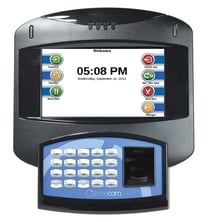Not all employee creativity reaps benefits for your company. Some employees can get awfully creative in how they execute a time card fraud scheme. There are the oldies but goodies. Punching in for a co-worker (“buddy punching”) who’s running late. Not recording time taken off for lunch or when they leave early. Others find ways to pad their time, enough perhaps even to “earn” a little overtime pay. The really inventive may even create ghost employees and pocket that income.
We’ve gone in-depth in the Accu-Time Systems blog on how you can reduce labor costs with the right time and attendance system. Yet there’s no better way to reduce labor costs than to stop paying for time that’s not being worked! That’s all time card fraud is – an employee asking to get paid for time not actually worked.
Here are five ways your company can avoid time card fraud and stop paying for time not worked.
Go biometric
Moving to biometric time clocks as the front-end of your time and attendance system is typically our first suggestion  because nothing collapses time card fraud tricks like buddy punching or not punching on schedule like a biometric time clock.
because nothing collapses time card fraud tricks like buddy punching or not punching on schedule like a biometric time clock.
It eliminates the possibility that any particularly bold manager has put ghost employees on your books.
Ban manual time sheets
If you aren’t using biometric time clocks, you still must drop pen and paper time sheets. No system makes it easier to pad time. Furthermore, it makes doing ongoing data analysis to highlight time reporting anomalies nearly impossible.
Using a time and attendance system fronted by time clocks, whether physical or virtual, is the first step. You also need those clocks to feed constant data flows into the time and attendance system, which enables operations, payroll and HR managers to set up a series of checkpoints where time can be assessed for accuracy (check out tips three and four).
Data analysis can’t occur in a timely way using paper time sheets that have to be manually uploaded into a system. Sure, managers can check manual time sheets, but don’t managers have higher-value tasks to spend their time on? By the time the manual uploads are done, the time for quickly shutting down someone trying to pad time has passed.
.jpg?width=600&height=140&name=TimeCom_ExploreNewFeatures_600x140%20(1).jpg)
Configure real-time flags and reporting to stop attempted time card fraud
The reporting and notification capabilities vary among time and attendance systems. Yet they all provide robust opportunities to stay ahead of time reporting fraud before payroll gets ran run.
For example, the system can be setup to send a manager a daily exception report showing where actual punches in and out deviated from the schedule. This allows the manager to end either sloppy compliance or potential time card fraud before it impacts the company’s bottom line. Payroll managers can get weekly reports if payroll is trending over budget, giving them time to look into what’s causing the overrun.
Set up regular audit procedures into your payroll reviews.
HR and operations managers can start with running spot audits on random employees’ time cards as part of set procedure for minimizing time card fraud. Each week, two employees in the same department have their punches audited for anomalies. Payroll can run weekly reports to determine if certain departments are consistently over budgeted payroll. Maybe it’s time card fraud; maybe it’s poor scheduling or other managerial mismanagement. Either way, it provides impetus to investigate.
Employees can get creative in devising time card fraud schemes. Fortunately, the technology at your disposal to prevent and quickly end time card fraud attempts is even more creative. If you’re feeling unsure about biometric clocks, one of your best lines of defense, let us dispel the myths that surround them.




 because nothing collapses time card fraud tricks like buddy punching or not punching on schedule like a biometric time clock.
because nothing collapses time card fraud tricks like buddy punching or not punching on schedule like a biometric time clock. .jpg?width=600&height=140&name=TimeCom_ExploreNewFeatures_600x140%20(1).jpg)
